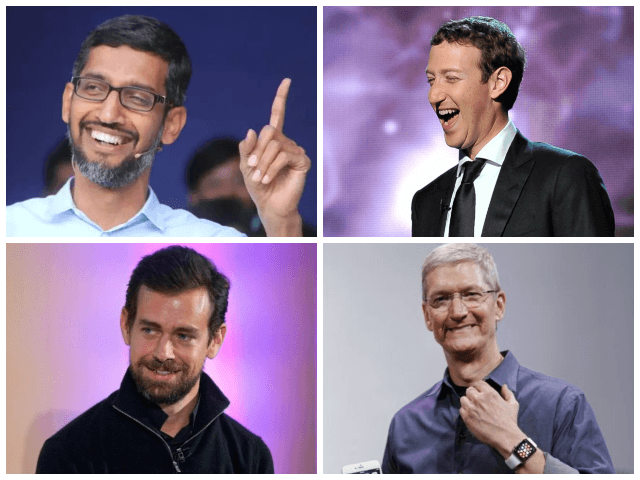Schools are being shut down. Workers are being sent home from offices. Universities are telling their students not to return to campus. Political rallies are being called off. People are staying indoors. All of these moves represent a boon for the Masters of the Universe in Silicon Valley.
In the year of the pandemic, connection to the internet and to online services has never been more useful. While work-from-home arrangements, online classes, and online political activity have all enjoyed significant growth over the past decade, the Wuhan coronavirus is switching those trends into overdrive.
Over the next few months, many will discover the convenience of working from home. Students will wonder why they need to fly out of their hometowns to faraway colleges when they can do everything they need from a laptop. Politicians will realize that they can reach far more people, with much less effort, by holding a virtual townhall in lieu of a rally. Unless you fail as badly as Joe Biden, this will be a plus for a candidate’s campaign.
And what about elections? In Britain, local and mayoral elections have been postponed by a year because of the Wuhan Virus. That’s a nice free year in office for left-wing London mayor Sadiq Khan, but if elections being pushed back becomes the new norm, voters of all parties will start to wonder — why can’t we vote from our laptops and smartphones?
There’s nothing inherently wrong with a rapid shift into the digital sphere. It may well make our lives more efficient and convenient. There’s just one problem — the technologies you’ll be using will be controlled by Silicon Valley.
Voting from home may sound prudent during a global pandemic. But what if the voting software is controlled by Microsoft? Do you trust Microsoft? This is a company whose former board member, Reid Hoffman (also co-founder of LinkedIn) funded a Russian-style digital election interference campaign in the 2017 Alabama senate runoff.
Virtual townhalls are great if you’re a Democrat candidate, but not so great if you’re a Republican. Then you can expect to be covertly “shadowbanned,” denied verification, have your campaign ads banned on YouTube and Facebook, and in the case of candidates like Tommy Robinson and Laura Loomer, banned from social media platforms altogether.
Big Tech platforms already had a huge and growing influence on politics. With rallies and political events getting canceled, that will only increase — putting banned candidates like Loomer at a colossal disadvantage. Her campaign has already canceled a drive to collect signatures for ballot registration due to the coronavirus pandemic, opting to pay a registration fee instead. What happens when a political candidate can’t do physical campaigning or digital campaigning?
Ordinary citizens who are banned from major platforms will also run into trouble. If politicians start holding townhalls using platforms like Facebook Live and Periscope, how will citizens who are banned from those platforms ask them a question? Worse, if elected officials use the big tech platforms to broadcast important information about the coronavirus or other crises — as Florida Governor Ron DeSantis did during Hurricane Dorian last year — how are citizens who’ve been banned from those platforms supposed to find out about it?
If you’re staying indoors to escape a pandemic, chances are you’ll be making more online purchases than normal. If you’re self-employed, you might want to start selling your products and services online. But that becomes significantly harder if you’ve been banned from PayPal or Stripe or even denied a bank account for political reasons.
With governments warning you to stay inside, you might alleviate your boredom by playing online video games. Unless XBox Live or other gaming platforms have banned you for using mean words, that is.
Missing your social life? Well, at least you can use Facebook and Twitter to talk to your friends. Oh wait — unless you’re banned. Dating? Don’t worry, there are apps for that. Unless you get too political — then you’ll be banned there too. Afraid to go to the grocery store? You can order food on Uber Eats — unless Uber’s banned you for “hate speech.” Is your lecturer holding his seminars on Facebook live? Sorry, you can’t participate, Facebook’s banned you!
All of this assumes, of course, that people are being banned for concrete reasons, and not due to faulty algorithms, which happens all the time. Facebook and other social media platforms sometimes correct those mistakes. Sometimes. They don’t, after all, have a massive incentive to do so — losing one user isn’t much of a financial blow, and thanks to the legal immunities of Section 230, no user has yet been able to successfully sue a platform for wrongful termination of their account.
The Wuhan coronavirus could have Americans staying indoors for weeks, maybe even months. It could force us to move large parts of our everyday lives online, accelerating pre-existing trends. Except that some people, because of arbitrary and politically biased censorship from the tech giants, won’t be able to.
With government turning to the private sector, including tech giants, for help tackling the crisis, perhaps the nation’s leaders will finally be forced to seriously confront the fact that for many Americans, access to digital platforms is fast becoming not merely a luxury, but an essential need. Big Tech can no longer be allowed to take it away on a whim.
Allum Bokhari is the senior technology correspondent at Breitbart News.

COMMENTS
Please let us know if you're having issues with commenting.